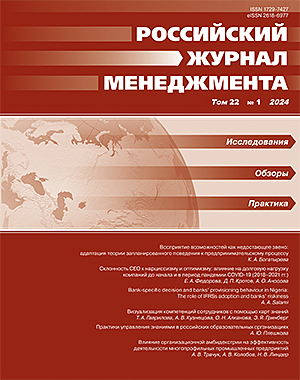Банковские решения по формированию резервов в Нигерии: внедрение МФСО и банковские риски
DOI:
https://doi.org/10.21638/spbu18.2024.103Аннотация
Цель исследования: проверка наличия взаимосвязи между поведением банков в части формирования резервов на покрытие возможных потерь по ссудам и разнообразными банковскими решениями по учету кредитных потерь на примере нескольких случаев незакрытых кредитов, которые затрагивают нигерийские депозитные банки.
Методология исследования: в рамках международных стандартов финансовой отчетности (МСФО) исследуемая взаимосвязь сопряжена с риском неплатежеспособности. Для ее анализа построен индекс банковских решений по кредитным потерям. Проверка гипотез осуществляется на основе оценок параметров регрессионной модели с учетом корректировки стандартной ошибки, применяемой в случае панельных данных.
Результаты исследования: показано, что дискреционные корректировки резервов на возможные потери по ссудам характерны для банков Нигерии, однако при этом не учитывается манипулирование прибылью, свойственное дискреционным корректировкам. В случае использования МСФО наблюдается увеличение дискреционных резервов на покрытие потерь по ссудам при принятии решений банками. Исключением являются финансово неустойчивые банки. Эти результаты в значительной степени подтверждаются при индивидуальном тестировании связи компонентов индекса банковских решений с поведением по формированию резервов. Согласно исследованию, поведение по формированию резервов в Нигерии в период глобального финансового кризиса является проциклическим (нерациональным), а во время местной экономической рецессии 2016–2017 гг. — контрциклическим (рациональным). Для последнего случая, когда уже был принят набор МСФО, стало характерно сглаживание прибыли на уровне банковских решений.
Оригинальность и вклад авторов: работа развивает исследования посредством проверки более длинного списка специфичных для банка факторов, вызывающих корректировку решений, касающихся кредитных потерь. Она уникальна тем, что опирается на эмпирическую базу, включающую в себя многочисленные банковские решения, которые рассматриваются как единый фактор при учете кредитных потерь. Также констатируется локальный успех институциональных изменений в организациях Нигерии и предлагаются полезные предложения по дальнейшей деятельности.
Ключевые слова:
банковские решения, резервы на возможные потери по ссудам, институциональные изменения, финансовое благополучие банков, Нигерия
Скачивания
Библиографические ссылки
References
Загрузки
Опубликован
Как цитировать
Выпуск
Раздел
Лицензия
Статьи журнала «Российский журнал менеджмента» находятся в открытом доступе и распространяются в соответствии с условиями Лицензионного Договора с Санкт-Петербургским государственным университетом, который бесплатно предоставляет авторам неограниченное распространение и самостоятельное архивирование.





